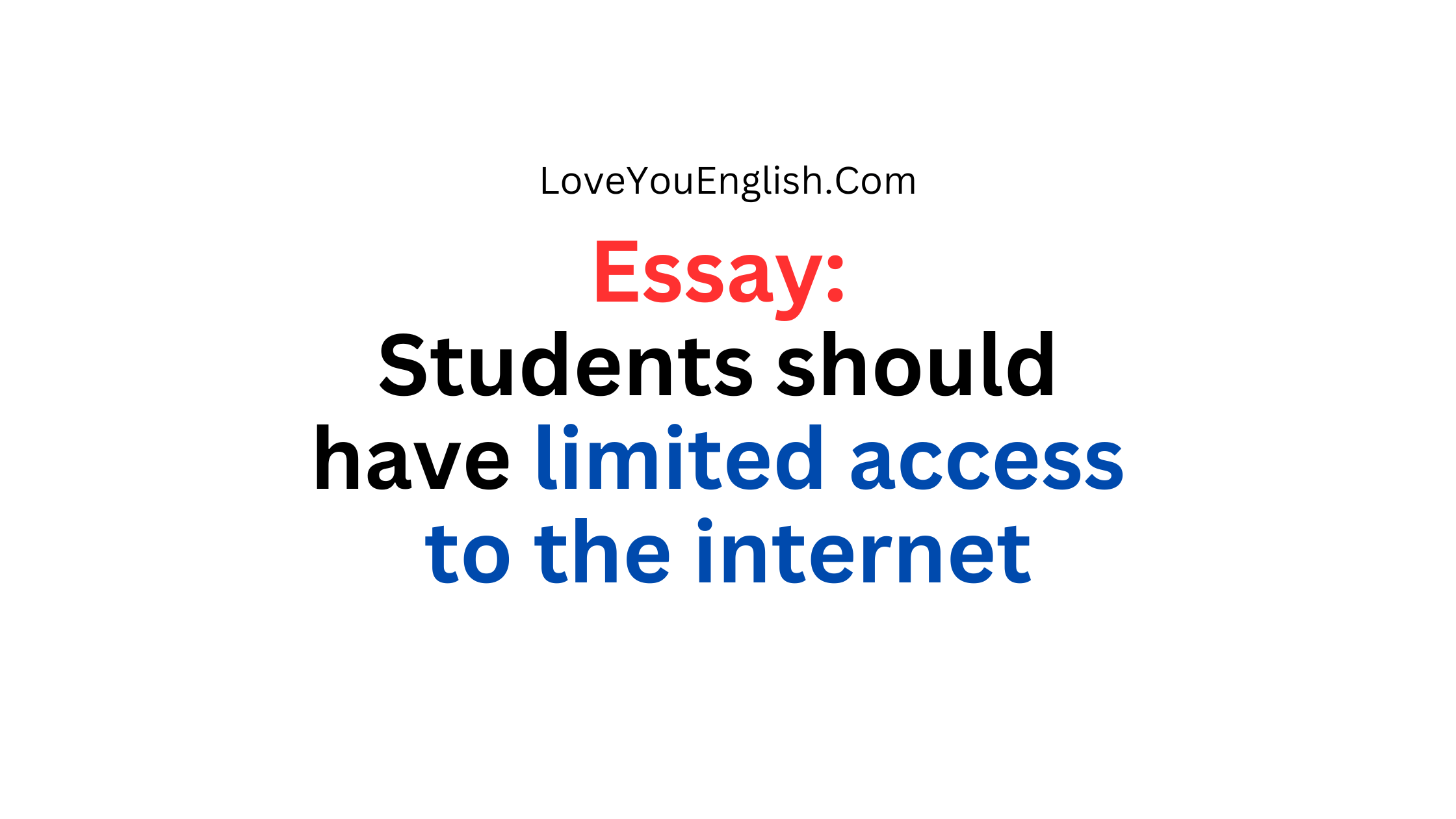Essay Writing: Students Should Have Limited Access to The Internet
Essay Writing: Students Should Have Limited Access to The Internet
The discussion about how much internet access students should have is a hot topic in education right now.
With technology and the internet being everywhere, teachers, parents, and leaders are still debating the right amount of access for students.
This essay will explore the main arguments for and against limiting internet use for students, consider how it might impact their learning and development, and propose a balanced approach to the issue.
Supporters of limiting student internet access have some key reasons for their stance:
Minimizing distractions:
The internet is packed with fun and engaging content that can easily divert students from their studies.
Social media, online games, and videos can distract students and make it tough for them to focus. By restricting access, schools can help students concentrate better on their education.
Protecting students from harmful content:
There is a lot of inappropriate and violent material online that can negatively affect young minds.
By limiting what students can access, schools can shield them from this type of content and create a safe learning environment that is appropriate for their age.
Encouraging critical thinking and research skills:
When students have unlimited access to the internet, they might rely too much on quick searches instead of learning how to think critically and conduct proper research.
By setting some boundaries, teachers can motivate students to use traditional research techniques, think more deeply about topics, and enhance their abilities to find and understand information.
Reducing cyberbullying and online harassment:
Unlimited internet access can lead to an increase in cyberbullying and online harassment among students.
By limiting internet use during school hours, we can help reduce these negative behaviors and create a safer environment for everyone at school.
Promoting face-to-face communication:
If students spend too much time online, they may become less likely to engage in real-life conversations.
By restricting internet access, schools can encourage more in-person discussions and collaboration, which helps students build essential social skills.
Protecting student privacy and data:
Having unrestricted internet access can endanger students’ privacy and lead to data breaches.
By limiting access, we can better safeguard students’ personal information and teach them how to be responsible while online.
More essays:
- Essay About Christmas for Students and Children
- The Cow Essay in English for Students
- Essay about India For Students In English
- Essay About Swami Vivekanand for Students
- Essays about Rabindranath Tagore for Students
Arguments Against Restricting Student Internet Access
People who oppose limiting internet access for students argue that these restrictions can lead to several problems:
Denying access to essential educational resources:
The internet is packed with useful educational content, such as scholarly articles, instructional videos, interactive tools, and up-to-date information.
Restricting internet access could deprive students of these important resources, making it tougher for them to learn effectively.
Failing to prepare students for a tech-driven future:
As our society becomes increasingly digital, it’s vital for students to develop strong technology skills.
If schools impose limits on internet access, students may not be equipped to handle the technological challenges they will encounter in college and their future careers.
Stifling creativity and self-directed learning:
The internet offers numerous opportunities for students to showcase their creativity and pursue independent learning.
When access is limited, students may miss out on exploring their interests, discovering new knowledge, or working on projects they are enthusiastic about.
Widening the digital divide:
Not all students have the same level of internet access at home.
If schools restrict access, it could exacerbate the existing gap and disadvantage students from low-income families, especially those who rely on school for online learning resources.
Losing Trust and Independence:
Strict internet rules can make students feel like they aren’t trusted, which might take away their independence.
This can lead to frustration and might push students to find ways to bypass the rules instead of learning how to use the internet in a responsible way.
Reducing Teamwork and Global Connections:
The internet gives students the chance to collaborate with peers from all over the world and learn about different cultures.
If access is restricted, it could limit opportunities for global learning and sharing cultural experiences.
How Limiting Internet Access Affects Learning and Growth
Choosing to limit student internet access can have a big impact on various aspects of learning and personal development:
Understanding Information:
While reducing internet use might encourage students to depend more on traditional research methods, it could also prevent them from building essential digital skills needed to evaluate online information and navigate the information landscape today.
Tech Skills:
Restricting access might make it tougher for students to become proficient with different digital tools and platforms, which could put them at a disadvantage in their future education and careers.
Self-Control:
Having unrestricted access allows students to practice managing their time and self-discipline, which are crucial skills in today’s digital age. However, it can also be overwhelming for those who struggle to stay focused.
Creativity:
The internet is an awesome tool for boosting creativity and generating new ideas.
If students don’t have enough access, they might miss out on discovering new concepts, experimenting with digital tools, and finding creative solutions to problems.
Social Skills:
Reducing internet use can help students interact more face-to-face, but it might also limit their opportunities to learn how to communicate online and manage digital social situations in a responsible way.
Interest in Learning:
The internet can really ignite students’ passion for learning by allowing them to explore their interests and connect classroom lessons to real-world experiences.
If there are too many restrictions, it could dampen their enthusiasm and engagement in learning.
A Balanced Approach
Given how complex this issue is, a careful and balanced strategy for managing student internet access seems to be the best way to go.
This strategy should focus on these important points:
Age-appropriate access:
Internet guidelines should be suitable for the age and maturity of the students.
Younger children may need stricter rules, while older students can enjoy more freedom with proper guidance.
Supervised internet use:
Rather than enforcing strict rules for everyone, schools can provide supervised internet access where teachers guide students on how to act responsibly online and develop essential digital skills.
Targeted restrictions:
Instead of completely blocking internet access, schools can impose specific limits on certain types of content or during particular times, allowing for educational opportunities while minimizing distractions.
Teaching digital citizenship:
Schools should prioritize teaching digital citizenship, which covers online safety, privacy, responsible usage, and ethical behavior in the digital space.
Involving parents:
Schools should work together with parents to ensure that internet use policies are the same at home and school, creating a consistent approach to digital learning.
Updating policies:
Internet access rules should be reviewed and revised regularly to keep pace with new technology and evolving educational needs.
Personalized learning plans:
Schools can develop customized internet access plans for students that address their individual needs, learning styles, and ability to manage their own education.
Integrating technology in teaching:
Teachers should be trained on how to effectively incorporate technology and online resources into their lessons, so they can fully utilize the educational benefits that come with internet access.







